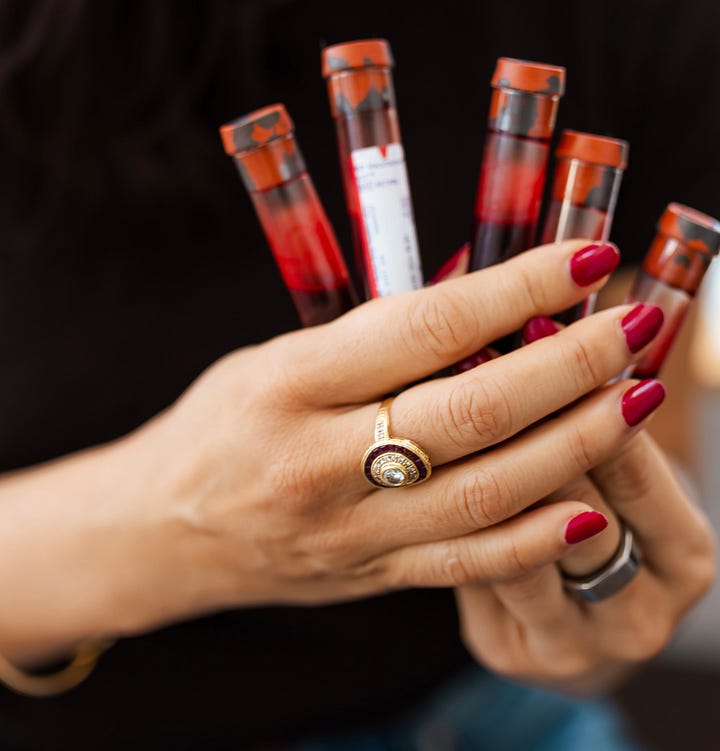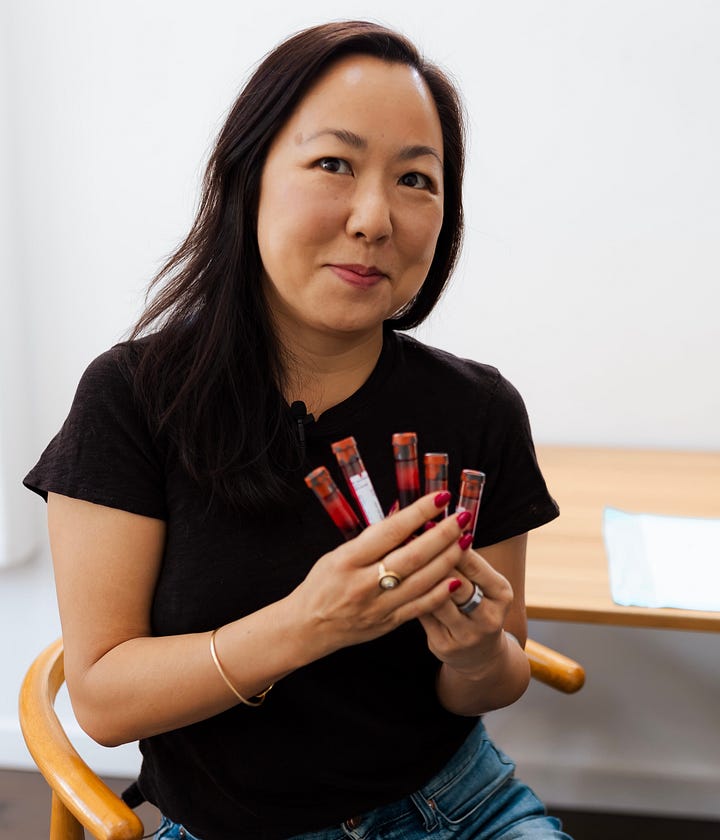Beyond Basic Bloodwork
Empowered patients are on a quest to understand their own biology. Plus, my bloodwork experience with Joi Women's Wellness.


“Your labs look normal. See you next year.”
It’s a familiar story. You get bloodwork done at your annual physical. Weeks later you are told your levels are, “within range,” so you have nothing to worry about. At best, you get a generic, two page report from Labcorp uploaded to your patient portal.
Relieved? Perhaps. Informed? Definitely not.
Welcome to Medicine 2.0, where, as Dr Peter Attia describes it, we’re kept on a need-to-know basis until our levels veer out-of-range or symptoms of chronic disease emerge.
It’s easy to feel invincible when everything seems fine on the surface. Normal labs plus normal weight equals no problem, right? But as I discovered firsthand, what lies beneath can tell a different story altogether.
My journey began with routine check-ups, each one reassuring me of my health year after year. Until, one day my bloodwork revealed elevated A1C and fasting glucose levels, signaling the onset of prediabetes. (Read my story here)
Yet this condition didn’t manifest overnight. The signs of insulin resistance had been quietly brewing for over a decade.
Everything looks normal, until it doesn’t.
When it comes to your bloodwork, the algorithmic approach leaves a lot of context on the table. Some important questions to consider:
Are you testing all of the necessary biomarkers?
ie ApoB is a stronger predictor of heart disease than just LDL cholesterol
Do you understand the interconnectivity of certain labs/biomarkers?
An “in range” HgA1C (under 5.4) matched with an elevated fasting insulin (30) signals metabolic dysfunction
Are you reading the labs in the context of other variables?
Are you in perimenopause with fluctuating hormones?
Are you looking at trends over time?
Have your levels been steadily increasing over the years with no adverse event or change to diet or lifestyle?
“The truth is that most doctors don’t understand how to interpret lab results in a meaningful way….Physicians are trained to follow rules with lab interpretation rather than to step back and read the integrated tea leaves of what it all means.”
— Casey Means, MD (excerpt from NYT Bestseller Good Energy)
🩸Reasons to get Comprehensive Bloodwork
Scientific research on behavior change shows that patients who have access to their own health data are more proactive and impact their health outcomes in a positive way.
1/ Understanding Root Causes of Symptoms
Symptoms are often the body's way of signaling underlying imbalances or issues.
Whether it's fatigue, mood swings, or digestive issues, identifying all contributing factors and their relationship to one another reveals the root cause.
2// Early Detection of Chronic Disease Risk
Many individuals are unaware of underlying health issues until they manifest into something more serious.
An early warning system, spotting red flags before they escalate into diabetes or heart disease means there’s time to intervene and mitigate risks.
3/ Establishing Baselines for Tracking Health Trends
The ability to establish baselines offers a snapshot of your health when you're younger in order to create a reference point for tracking trends over time.
Monitoring changes in key biomarkers allows for adjustments to lifestyle, diet, and supplementation to maintain optimal health and prevent disease progression.
4/ Identifying and Addressing Nutritional Deficiencies
Shedding light on nutritional deficiencies that may otherwise go unnoticed helps with precision supplementation.
From vitamin D and B12 to iron and magnesium, these deficiencies can impact energy levels, bone health, and sleep.
A New Era of Medicine
In this era of bio-observability1 — the ability to observe your own biology through wearables (Oura ring, CGM) and direct-to-consumer lab testing — patients can now take a more active role in their health outcomes.
While I champion squeezing every last drop out of your insurance to justify its exorbitant cost, there are moments when venturing out-of-network and dipping into your own pocket ensures superior care. (read my deep dive on health insurance here)
Recently I tried the Comprehensive Panel at Joi Women’s Wellness2, a telemedicine provider who tested 77 of my biomarkers. Their insightful report not only presented my results against optimal ranges but also provided calculations of key ratios, such as triglyceride-to-HDL, offering a deeper understanding beyond mere levels.
Joi, alongside their counterpart for men, Blokes, has negotiated lower rates with labs allowing individuals to access a truly comprehensive panel at an affordable price, independent of insurance. However, I attribute the most value in their follow up appointment where an informed medical practitioner spent 45 minutes with me to review every single significant result and offered action items to improve my levels.
So, what did I learn from this experience?
Out of 103 results, 62 landed in the optimal range. I still have some work to do.
Declining hormones due to perimenopause are likely driving elevated ApoB, cholesterol and LDL, despite a healthy diet and dedicated fitness. It’s critical for women over 40 to manage these markers to lower risk of heart disease.
My liver function is excellent. Years of removing alcohol, ultra-processed food and environmental toxins have helped.
Existing Vitamin D and Ferritin deficiencies are now at optimal ranges due to adequate supplementation. You need to be able to absorb your vitamins and track their efficacy! (read my story on supplements here)
Overall, I felt empowered by this insight into my own biology — something I encourage my coaching clients to strive for. While we shouldn’t over-index on the numbers, I do believe they are an important piece of the puzzle as they inform some of our decisions.
Resources
Two excellent resources as you consider upcoming bloodwork and to understand the fundamentals about your biology to drive good health.
🥕Good Energy by Casey Means, MD
My incredible friend Casey and her brother Calley Means are on a mission to educate everyone about the connection between metabolism and limitless health
There is a chapter called, Your Body Has the Answers, dedicated to the essential lab tests you need, how to read blood tests and get insights from wearables
This book launched last week and it’s already a NYT Bestseller — it will change the way you live, eat, sleep, and think about preventing chronic disease FOREVER
Cost: $32
💉Joi Women’s Wellness and Blokes
An online provider boasting longevity expert Dr. Amy Killen as their Chief Medical Advisor, they offer comprehensive diagnostic labs, along with turn-key solutions for hormones, peptides, and supplements tailored to your specific needs and results.
Labs: Women’s Panel (77 biomarkers) | Men’s Panel (74 biomarkers)
Follow up: an in-depth visual report using optimal ranges and a private 45-min telemedicine appointment with a knowledgable practitioner to review your results and answer all your questions
Cost: $599/test or $958/2 tests (use code: Celia15 for 15% off discount)
The take-away: You’re not basic so why are your labs? Dig deeper into your own biology to understand what your body is telling you. Data is only valuable if you know how to decipher it and use it to your advantage.
All writing is for informational and entertainment purposes only and is not a substitute for medical advice, diagnosis or treatment.
Phrase coined by Levels CEO Sam Crocos (from Good Energy by Casey Means, MD)
I was not charged for this lab panel during my trial. I accepted it without any promise of a positive review. I only promote products and services that I believe to be best-in-class that will benefit my readers, followers and coaching clients — relationships that I safeguard above all else.




